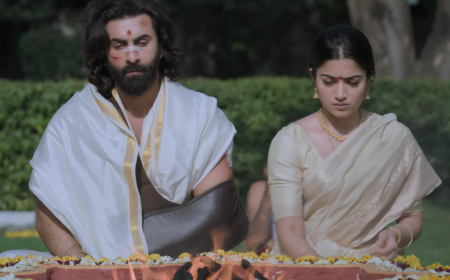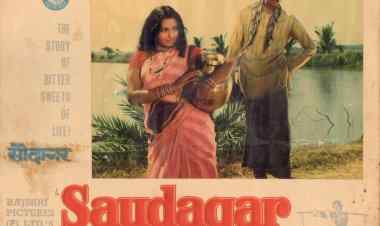Varun Khhetry is an alumnus of the Satyajit Ray Film and Television Institute, Kolkata. He has recently made a short film called Kosha Mangsho in Bengali language. It narrates the story of three housewives with their husbands and daughters through three generations spanning– the 1980’s, 2000’s and 2024. Director Varun Khettry was born in Kolkata, India and grew up in a Jamshedpur, after which he studied in a couple of boarding schools in the heartland of the country which gave him an opportunity to be exposed to the vast diversity of India. The love for films and stories from childhood made him decide to pursue filmmaking instead of studies that he was struggling with tremendously.

Image: Filmmaker Varun Khhetry
Kosha Mangsho is a very delicious dish in the Bengali menu where mutton is the main ingredient. Its great taste lies in the fact that it is cooked with conventional spices in its own gravy for a long time over a stove or a gas oven or earlier, in an earthen oven over low heat. It is amazing how within the short span of 13 minutes; the director has managed to narrate a story that crosses three generations of women. The film underscores how social conditioning in a patriarchal society denies the woman the desire even to question why she has been imitating the strange practice of keeping one piece of raw meat aside and cooking the rest. She does not know why she does it and it never occurred to her to ask her mother.
Asked what decided him to make this film in Bengali, Khettry says, “I am actually born in Kolkata and have been fascinated with the language and culture thanks to Satyajit Ray and a cook at home who was Bengali introduced me to the culture of Bengali and Bengali cinema and this got me interested in making my first independent film in Bangla.”
The story begins in a conventional Bengali home in the 1980s where the housewife is preparing the spices to make kosha mangsho for the growing daughter, her husband and herself. The daughter, who is practicing music, is scolded by her conventional father to stop her music and help her mother in the kitchen which appears to be an open space on the terrace. She notices that her mother has kept one piece of meat aside in a bowl and has not added it to the entire dish being cooked. When she asks why, her mother says that she saw her mother do it but never asked why. So, she was just imitating her mother without knowing why.
There is a time-leap to 2000 and one faces another slightly modernized family where the mother is cooking kosha mangsho and her daughter asks her the same question which her mother has no answer for.
The narrative jumps to 2024. Though we discover that the family has kept up with the technological changes over time, what with the husband playing with the TV remote and the daughter toying with her mobile, dinner served on a properly laid dining table, the modern wife still has the same answer to the same question. These three women across three generations were blindly following what they had seen their mother do without ever asking why they needed to keep one piece in a separate bowl while the rest of the meat was cooked.
What we see is that three daughters of the same family lineage, born in these three different eras, carry forward a traditional family recipe of “Kosha Mangsho” without knowing or even trying to know why they keep one piece of meat aside. With carrying that recipe forward, they also carry forward some practices of their mothers with them. When the current generation’s teenage daughter asks a pertinent but a curiosity-filled question, it makes the older generations (mothers) ponder about it lot. But it is too late for them to learn the answer. But do they really ponder? Or, do they keep on doing what they have been doing right through their lives. The husbands in the first two generations are shown to be very feudal with clear ideas of what a woman or girl should do while the wives and daughters are acquiescent.
Asked why he decided to keep the film open-ended without giving it a closure, Khettry says, “I would like the audience to see the film first and keep everything under the lid for now.” The film was shot in North Kolkata, Central Kolkata and in Khettry’s own house in Newtown.
Khettry goes on to narrate the problems with finishing the film. “This film has had a long journey, I had shot the middle portion of the film & tried to raise funds through crowd-funding but I could not hit the target and my whole campaign collapsed, but the word having spread a bit it fell on the eyes of a journalist at "The Film Companion Studio" Mrs. Sneha Desai and she called me in for an interview to speak about my journey as an assistant director on films and then allowed me two minutes to speak about my crowd-funding campaign running on “Wishberry”. The campaign eventually failed but that interview reached a producer in Punjab Mr. “Dhiraj Arora” who finally produced it.”
Talking about the problems with the screening of his film which is too short for a theatrical screening, Khettry said, “It's still sad to see in a country crazy about feature films not paying much attention to short narratives though one must amidst that much heed to a shorter narrative, every story cannot be fit into any format. Each has it's own punch and twist to it which might get completely stretched in a feature film and spoil the whole thing. It has been six years since we shot the film, no OTT platform or any major studio supports short films. It’s more like a diploma film or a show-reel to present to producers the level of cinematic aesthetic we have in us as a team. However, given that, I would like to thank Chandradip Goswami, the music director of the film and Mr. Mrinmoy Mondal the cinematographer who have poured magic into this film with their immense craft and talent. The actors too, such as, Basabdutta, Jaya Seal Ghosh, Jayati and Shaheb Chatterjee have helped make the film it has become with their spontaneous performances in such a short film.”
The film, Kosha Mangsho has just been selected by the Imagine- India Film Festival to be held in Madrid, Spain in September.



































































